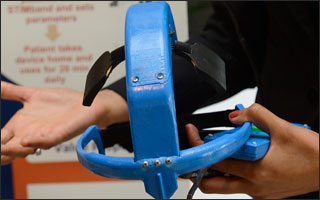Biomedical engineering graduate students have invented a promising in-home treatment option to deliver noninvasive brain stimulation — a treatment used to curb the debilitating symptoms of advanced Parkinson’s disease. Parkinson’s disease produces symptoms which include tremors, muscle stiffness, and slowed movement. This incurable neurodegenerative disorder affects 1 million people in the United States and 7 million worldwide. While medication can help, it becomes less effective over time.
For patients in advanced stages, one treatment option is deep brain stimulation. In this procedure, a surgeon implants thin electrical leads into the region of the brain that controls movement. Electrical signals are then passed through electrical leads to the brain to help curb some symptoms caused by Parkinson’s.
“We saw that this procedure is really invasive and can take 10 to 15 hours to complete,” said Shruthi Rajan, a design team member from Charlotte, NC. “It’s also very expensive, and not all patients qualify for the surgery. We asked if there was a way to provide the same treatment in a less invasive way that doesn’t require brain surgery.”
The students aimed for a prototype that would enable a patient to activate the battery-powered treatment by touching a large easy-to-press button. While the prototype, called Tremtex, hasn’t yet been tested on humans, it’s seen as a promising first step toward helping Parkinson’s patients safely relieve their own symptoms. The device is designed to safely deliver current for only 20 minutes daily and only at a doctor-prescribed level.
The BME design team met with dozens of Parkinson’s patients to craft the critical headband component so that it would be easy to put on, comfortable to wear, and positioned so that the electrodes would remain stable and properly target the motor cortices areas of the brain.
The Tremtex deep brain stimulator won the $5,000 second-place prize in VentureWell’s BMEidea national design contest for biomedical and bioengineering students. In May, the invention earned first-place honors in the People’s Choice Award competition at Johns Hopkins’ Biomedical Engineering Design Day 2015. Earlier, it was a finalist in the Rice University Business Plan Competition.

